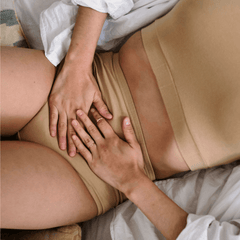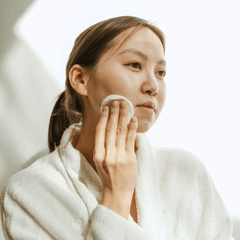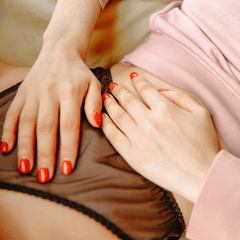Can Hormonal Acne Be Caused by Stress?

The short answer is yes. Stress is a major culprit when it comes to hormonal acne. You’ve probably heard of the stress hormone, cortisol, but what you may not understand is exactly how high cortisol, caused by stress, creates hormonal chaos inside the body and why it can lead to hormonal acne or stress acne. We’re here to break it down.
THE ROLE OF PROGESTERONE IN HORMONAL ACNE
We’ll start with progesterone. This hormone works (in combination with estrogen) to help regulate skin health. It does this by keeping the acne-causing form of testosterone, DHT, balanced. Ultimately, when progesterone is too low, it can’t properly do its job to keep DHT in check. DHT builds-up and causes excessive oil production, clogged pores, and eventually hormonal acne. These stress pimples typically appear around the chin, mouth, and jawline. Since progesterone works so closely with estrogen, these two hormones must maintain a certain ratio. When progesterone is low, it means estrogen is high. This common hormone imbalance, known as estrogen dominance, results in several other symptoms like PMS, weight gain, and heavy or irregular periods.
Learn more about the connection between estrogen, progesterone, DHT, and breakouts.
THE IMPACT OF CORTISOL ON HORMONAL ACNE
Both progesterone and cortisol are produced in the adrenal glands. When your body is stressed, the adrenal glands prioritize the production of the stress-fighting, anti-inflammatory hormone cortisol, over the production of progesterone. The more stressed you are, the more cortisol you produce, the more progesterone decreases, and more likely you are to experience stress pimples.
There are many other issues brought on by stress that increase the likelihood of hormonal acne. For example, stress causes an increase in androgens to protect the brain from the negative effects of cortisol. These androgens are precursors of DHT, the acne-causing hormone. Stress can also negatively reshape the composition of your gut bacteria. Since excess hormones are eliminated through your gut, an unhealthy GI tract means hormonal imbalances are exacerbated.
The goal isn’t to eliminate stress completely. Maintaining some degree of that fight or flight response is important in appropriately reacting to the demands of life. That said, unhealthy levels of cortisol brought on by chronic stress can clearly cause long-term hormone imbalances, which almost always show up on the body’s largest organ, the skin. Here are a few things you can do to help keep your cortisol balanced.
HOW TO REDUCE CORTISOL
SLEEP 7-9 HOURS EACH NIGHT
You’ve heard this one a million times, but its truly so important. Whether you’re aware of it or not, lack of sleep causes your body to react as if it’s in distress, releasing more cortisol. Sleep helps calm and restore the body so that you’re better able to cope with stressful situations. Sleep also gives your body and skin the chance to heal and repair itself.
Cortisol-Balancing Tips:
- Beyond getting 7-9 hours of sleep, go to bed and wake up at the same time each day. This will give your body a sense of regularity that anchors and improves the quality of your sleep.
- Your body needs to drop its temperature a few degrees to initiate sleep and to stay asleep, so sleep at a cool temperature (about 18 degrees Celsius) to make it easier on your body.
- If you’re struggling to fall asleep at night, try avoiding naps, alcohol, and caffeine during the day to improve your sleep cycle.
EXERCISE A FEW HOURS EACH WEEK
The body and mind are very much connected. Physical activity produces endorphins and serotonin which elevate and stabilize your mood in a way that helps reduce stress. With this in mind, it’s no surprise that sedentary lifestyles are linked to an increased risk of mental health conditions like anxiety. Physical activity can also help relieve physical stress caused by muscle tension.
Cortisol-Balancing Tips:
- Aim for 150 minutes of moderate aerobic activity or 75 minutes of vigorous aerobic activity each week for effective stress reduction.
- Focus on high frequency. It's better to walk every day for 15-20 minutes than to squeeze in a three-hour gym session once a week.
- Don't overdo it! Frequent HIIT workouts can have the opposite effect, increasing cortisol levels and adding to your stress load. Listen to your body's signals to find the right balance of intensity and recovery.
- Find forms of exercise that are enjoyable for you. Feeling intrinsically motivated to move your body will increase the likelihood that you continue to pursue your weekly workout routine, so experiment with everything from spinning, to dancing, to rock climbing.
INCORPORATE RELAXATION TECHNIQUES INTO YOUR DAY
The body responds to stress with muscle tension. At the same time, tense muscles tell the body that it’s stressed. Unless interrupted with a reminder or reason to relax, this positive feedback loop can continue indefinitely.
Cortisol-Balancing Tips:
- Meditation is the quintessential practice to bring about that relaxation reminder. There are countless meditation apps, videos, and books available to teach you how to meditate, but even if you dedicate just 10 minutes each day to slow, deep breathing, you’ll see benefits.
- Journaling can help process and reduce negative emotions like stress. Put your thoughts on paper to declutter your mind so you can think more clearly and solve stressful problems. Focus on gratitude to positively reframe stressful situations.
- Spend time outdoors. It not only forces you to unplug from the psychological and physical stress brought on by your computer and phone, but it also increases your exposure to natural hormone-regulating elements like sunlight and fresh oxygen.
AVOID INFLAMMATORY FOODS AS MUCH AS POSSIBLE
Triggers of psychological stress, like a presentation due next week or a fight you had with your partner, are usually more perceptible than physical stress inside the body. However, this internal stress is often equally prevalent. Compounds that are unstable in the body, like processed foods, wreak havoc on your insides and cause inflammation. Your body sees this inflammation as stress and responds with increased cortisol.
Cortisol-Balancing Tips:
- Processed foods are typically packaged and contain a long list of ingredients, many of which you probably won’t recognize. Avoid these foods along with highly processed cooking oils, like vegetable, canola, and soybean.
- Food intolerances have a similar effect—they cause inflammation in the gut, forcing the adrenal glands to prioritize cortisol over progesterone. Lay off any foods that cause a negative bodily reaction, like bloating or stomach pain (gluten is a common trigger).
- Environmental chemicals, whether consumed (ex. in the form of pesticides) or absorbed (ex. by using certain non-natural personal care products), can also impact your body in a way that causes physical internal stress. Do what you can to limit these toxins.
When it comes to stress acne, there’s a lot more going on behind the scenes than you may have realized. Chronic stress causes a slew of hormonal fluctuations and imbalances that can trigger skin breakouts. In that sense, managing both psychological and physical stress is an effective and free form of hormonal acne treatment.
Managing stress is a lot easier said than done, but sticking to small daily hormone-balancing habits can, over time, have a major impact. So, if you haven’t moved your body today, this is your sign. Get up, go outside, and walk around the block. Your body and skin will thank you.





